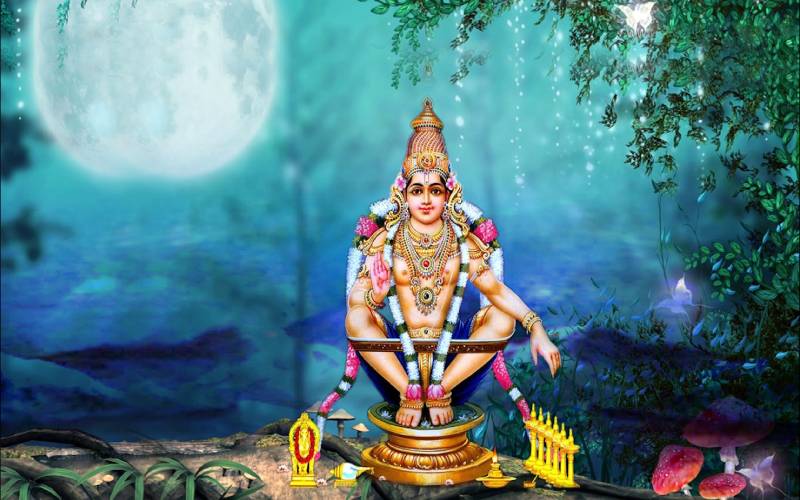‘Harivaraasanam’ is a nectarous lullaby song dedicated to Lord Ayyappa which is sung at the Sabarimala Shree Dharma Sastha Temple, in Kerala. It is also known as the ‘Hariharaathmajashtakam.’ This song idolizes Lord Ayyappa and elucidates His glories.
Lord Ayyappa is the divine child born to Lord Shiva and Mohini. He was born to destroy a demoness named Mahishi. Mahishi was the sister of the demon, Mahishasura, who had undertaken austere penance, which compelled Lord Brahma to grant him the boon that no man could destroy him. After Lord Brahma bestowed him the boon, Mahishasura, started terrorizing the rishi-s and deva-s. The deva-s prayed to Goddess Durga for protection, and She annihilated him. Mahishi was determined to avenge her brother’s death and secured a boon from Lord Brahma that only the offspring of Lord Vishnu (Hari) and Lord Shiva (Hara), could destroy her. Thus, Lord Ayyappa (Hari Hara Suthan) was born to Mohini (An avatara of Lord Vishnu in the form of a damsel) and Lord Shiva.
On one of his hunting sprees, King Rajashekara of the Panthala dynasty found this divine child abandoned in the forest. The childless king was a staunch devotee of Lord Shiva, and he took the child to his palace. The child was named Manikandan (One with a bell adorning the neck). Manikandan was a very precocious lad. He not only excelled in all shastra-s but also was a skilled warrior. His guru was aware that He was an incarnation of God. Manikandan ventured into the forest to procure the milk of a tigress which would cure the illness of His mother. There He witnessed the atrocities of the Demoness Mahishi and exterminated her. After His mission was accomplished, He made Sabari Hills His abode and has been blessing His devotees abundantly.
The song, ‘Harivaraasanam,’ was composed in lucid Sanskrit language. It was composed by the great poetess, Konnakath Janakiamma, in 1923. The song comprises of 352 letters, 108 words and 8 stanzas. Her father, Anantha Krishna Iyer, was the then Melshanthi (Chief priest) in the Sabarimala temple, and he offered this composition to Lord Ayyappa. This is a recent claim and apart from some handwritten notes there is no concrete proof regarding the composer. The melshanthi-s recite this ashtakam in Sabarimala nada, every night after Athala Seeveli (A ritual succeeding the neivedhyam or the divine dinner) as a lullaby song for the Lord to sleep. When the song is played in the temple, the priests leave the sanctum sanctorum without making any noise so that Lord Ayyappa who has fallen asleep after listening to the song does not get disturbed. And the lamps will be put off one by one.
There are several versions of this song rendered in many raaga-s. But the one composed by the late G. Devarajan in Madhyamavathi Raaga is very prevalent. It is considered a very auspicious raaga in Carnatic music. Madhyamavathi Raaga has a pentatonic scale and hence it consists only of five notes. Some of the evergreen Tamil movie songs such like, ‘Thirumaal Perumaikku’ (Thirumaal Perumai), ‘Aaghaaya Gangai’ (Dharma Yudham), ‘Neethaaney Endhan Pon Vasantham’ (Ninaivellam Nithya), ‘Thulli Thulli’ (Sippikkul Muthu), are based on this raaga.
This song was rendered by the acclaimed singer, K. J. Yesudas, became a sought-after song in every household in South India, after it was included in the Malayalam film, ‘Swami Ayyappan’ in 1975. K. J. Yesudas, popularly known as the Gaanagandharvan (Celestial Singer), in his ethereal voice has immortalized this song.

‘Harivaraasanam’ has an exclusive place in the hearts of Lord Ayyappa’s devotees. The in-depth meaning of the song is an ambrosia to the listeners. The Lord is glorified in myriad ways.
1. Lord Ayyappa sits on the supreme throne, enchanting the world. His divine feet are worshipped by Lord Surya (the Sun God). He is the one who kills the enemies of good thoughts, and the one who performs the cosmic dance every-day. “Oh! son of Lord Vishnu and Shiva, I seek refuge in you.”
2. He is praised as the one who likes the song of refuge, and who resides in the hearts of His devotees. The great ruler of the world, who likes to dance, one who shines like the rising sun and is the Monarch of all the beings.
3. He is the one whose soul is truth, and is dear to all souls. He is the creator of the universe, and shimmers with a shining halo. He is the essence of the Pranava mantra and one who loves songs and music.
4. He is the Lord who has the horse as His vehicle, and one with a cherubic face. He is blessed with the celestial mace as His weapon and is celebrated by the Vedha-s. He blesses His devotees just like a Guru (Guide and teacher) and enjoys devotional songs.
5. The Lord is worshipped by the three worlds and is the soul of all Deva-s (Gods). He is also the Lord of Shiva, the one with three eyes, and is worshipped by deva-s. He is worshipped three times a day by His devotees who grants the desires of His devotees.
6. The Lord destroys all fears and brings prosperity. He is the enchanter of the world and is adorned by the Holy ash (Vibhoothi) who rides on a divine white elephant.
7. The Lord blesses His devotees with an angelic smile who is the epitome of beauty himself. He is decorated with the fragrant sandalwood paste and has a soft and enchanting form. He is like lion to the elephants, and rides a tiger majestically.
8. He is very dear to His devotees and grants their wishes. He is extolled by the Vedha-s and revered as the one who blesses the life of ascetics. He is praised by the Vedha-s and is attracted to music.
The song, ‘Harivaraasanam,’ is truly beloved to many rasika-s. The soothing and lilting melody of this song leaves the rasika-s mesmerized and also transports them to a transcendental state.
 Yamuna is a resident of Coimbatore and is pursuing Hindustani vocal music under the tutelage of Shri Kedar Karatji. She also teaches bhajans and conducts English Grammar classes for school children. Her other passions are writing travelogues, playing keyboard, gardening, going on pilgrimages and exploring & enriching her knowledge through travel.
Yamuna is a resident of Coimbatore and is pursuing Hindustani vocal music under the tutelage of Shri Kedar Karatji. She also teaches bhajans and conducts English Grammar classes for school children. Her other passions are writing travelogues, playing keyboard, gardening, going on pilgrimages and exploring & enriching her knowledge through travel.
NEXT ARTICLE